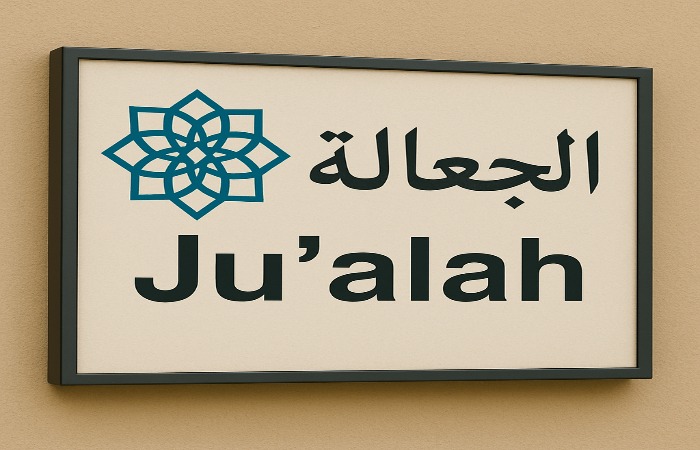Understanding Ju'alah in Islamic Finance
1. Introduction: Meaning of Ju'alah
Ju'alah is an Islamic contract rooted in classical fiqh (Islamic jurisprudence), often translated as a "reward-based" or "incentive" contract. It refers to a unilateral promise by one party, known as the Ja'il, to pay a specified reward (Ju'l) to any party (Amil or Maj'ul) who successfully accomplishes a particular task or delivers a defined outcome. Unlike bilateral contracts such as Ijarah (lease) or Mudarabah (investment partnership), Ju'alah is not mutually binding at the outset. Instead, it becomes enforceable only upon completion of the agreed objective. Historically, Ju'alah has been used in scenarios where outcomes are uncertain or where hiring a person under a typical employment contract is impractical - for example, offering a reward for finding a lost item or healing an ill person.
In essence, Ju'alah reflects the Islamic principle of promoting beneficial efforts and rewarding productive work, even when the performer is not pre-identified. It encourages public participation in socially useful tasks and ensures fair compensation once objectives are met.
2. Legitimacy from the Sharia Perspective
The legitimacy of Ju'alah is firmly grounded in the primary sources of Islamic law - the Quran, the Sunnah, and the consensus of scholars (ijma'). In Surah Yusuf (12:72), the brothers of Prophet Yusuf announce: "We are missing the king’s goblet, and whoever brings it shall receive a camel-load [of provisions]. I guarantee it." This verse clearly supports the permissibility of a promised reward for accomplishing a specific task.
In Hadith literature, Ju'alah was also recognized and approved by the Prophet Muhammad (peace be upon him). A well-known narration from Sahih al-Bukhari relates how some companions healed a tribal chief who was stung by a scorpion using Surah Al-Fatihah. They were later gifted a flock of sheep as a reward. When they informed the Prophet (PBUH), he affirmed their acceptance of the reward. Islamic scholars take the Hadith as a legitimate basis for Ju'alah as a Sharia-compliant arrangement.
3. Principles of Ju'alah
Several fundamental principles govern the Ju'alah contract:
- Unilateral Obligation: Only the offeror (Ja’il) is legally bound by the contract. The executor has no binding obligation unless they choose to undertake the task.
- Outcome-Driven Compensation: Payment is tied to the achievement of a defined result. If the goal is not met, no compensation is required.
- Flexibility in Executor Identity: Ju'alah may be offered to the public at large or to a specified individual. This openness broadens participation.
- Tolerance of Uncertainty: Unlike other contracts, a certain level of ambiguity is permissible regarding the executor, timeline, and methods - as long as the result is defined.
- No Prior Acceptance Needed: Since it’s a one-sided promise, no acceptance is required to initiate the contract. However, acceptance of the reward upon task completion is implied.
- Task Must Be Lawful: The work must be permissible under Sharia and should not involve prohibited activities or cause harm.
These principles make Ju'alah suitable for a variety of real-world applications where results matter more than process or identity of executor.
4. Principles of Operation
The operation of Ju'alah involves a structured approach to ensuring compliance with Sharia while maintaining commercial flexibility:
- Formulation (Sighah): The contract begins with a clear announcement or offer that outlines the task, expected outcome, and reward.
- Eligibility: The Ja'il must have legal capacity (e.g., not a minor or mentally incapacitated) to make binding promises. The executor must also be capable of completing the task.
- Reward Specification: The reward (Ju’l) must be pre-determined, clearly stated, and lawful. It may be monetary or in-kind (e.g., assets or services).
- Public or Private Offer: Offers may be made publicly (e.g., posters or ads) or directed to specific individuals.
- Completion and Entitlement: Only upon successful task completion does the executor become entitled to the reward. If the executor fails or if no result is achieved, the Ja’il is not liable to pay.
- Partial Performance: If partial results are obtained due to unforeseen circumstances, the executor may be entitled to proportionate compensation based on scholarly opinion and the views of Sharia schools or rulings from relevant Sharia boards.
These operational principles ensure fairness, risk sharing, and incentive-based cooperation without violating Islamic ethical or legal norms.
5. Types of Ju'alah
Ju'alah can be categorized into different types based on the scope and structure of the offer:
- Public Ju'alah: The offer is made to the general public with no specific executor in mind. For instance, a notice offering $1,000 for the return of a lost dog.
- Private Ju'alah: The offer is addressed to a specific person or firm. For example, a company may promise a reward to a consultant for solving a specific issue.
- Fixed Reward Ju'alah: The contract specifies a fixed amount payable upon task completion, such as $10,000 for identifying a software bug.
- Variable Reward Ju'alah: The reward may vary depending on the quality, timing, or extent of results—for example, a higher payout for faster completion.
- Parallel Ju'alah: One party receives the task under a Ju'alah contract and then subcontracts the task to others under another Ju'alah arrangement. This allows layered responsibility and specialization.
Each type caters to different operational needs, enabling Ju'alah to function effectively in both personal and institutional settings.
6. Additional Information
Several unique legal and practical features distinguish Ju'alah from other Islamic contracts:
- Revocation: The offeror may revoke the offer anytime before the task is completed. However, if the executor has started work and incurred expenses, they may be entitled to compensation.
- Executor’s Rights: While the executor is not obligated to accept the task, they gain enforceable rights once performance begins and conditions are met.
- Contractual Differences: Ju'alah is not a bilateral exchange like Ijarah. It is more flexible and suitable for uncertain or risky tasks, such as locating assets or generating creative ideas.
- Gharar Acceptance: Ju'alah allows a degree of uncertainty, which is normally not permissible in other contracts. This is because the benefit of the contract hinges on the result, not the process.
- Judicial Enforcement: Ju'alah contracts can be enforced in Sharia courts or arbitration tribunals, particularly if the terms and results are clearly documented.
- Jurisdictional Preferences: While widely accepted, the application of Ju'alah may vary slightly across jurisdictions and according to the interpretation of different Sharia schools and Sharia boards.
7. Modern-Day Application in Islamic Finance
Ju'alah’s characteristics make it especially relevant in today’s dynamic and outcome-oriented financial environment:
- Islamic Banking: Banks may use Ju'alah for debt collection services, offering a reward to agents who successfully recover overdue accounts. It can also be used in project-based advisory services where success determines compensation.
- Takaful (Islamic Insurance): Ju'alah is integrated into hybrid Takaful models where operators are rewarded based on performance, in addition to Wakalah or Mudarabah contracts. For instance, surplus-sharing arrangements may involve Ju'alah to incentivize efficient fund management.
- Islamic Capital Markets: In Indonesia, the central bank uses Ju'alah-based Sukuk (Islamic bonds) to manage liquidity through the issuance of Sharia-compliant investment certificates (e.g., SBIS). The Ju'alah structure rewards institutions for successful participation in monetary control.
- Crowdsourcing and Competitions: Startups or NGOs may offer Ju'alah rewards for developing innovative solutions, designing apps, or creating marketing campaigns. These models mirror the open nature Ju'alah offers.
- Legal and Compliance Services: Law firms or compliance auditors can be contracted under Ju'alah to deliver results - such as regulatory approval or successful litigation - before receiving compensation.
- Technology and Innovation: Ju'alah contracts are well-suited for software bug bounty programs, research competitions, or product development contests where rewards are tied to performance.
8. Conclusion
Ju'alah is a versatile and Sharia-compliant contract that rewards successful performance without requiring bilateral commitment at the outset. Its legal foundation is firmly established in Islamic sources, and it has been validated by scholars across multiple schools of thought. In today’s evolving financial landscape, Ju'alah offers Islamic financial institutions a powerful tool for structuring outcome-based agreements.
Whether in Islamic banking, Takaful, or capital markets, Ju'alah’s adaptability allows for innovation while maintaining ethical rigor. It promotes fairness, risk sharing, and entrepreneurship by aligning incentives with results. With proper governance and Sharia oversight, Ju'alah has the potential to bridge classical Islamic contracts with modern-day commercial realities, enriching the suite of instruments available in Islamic finance.










